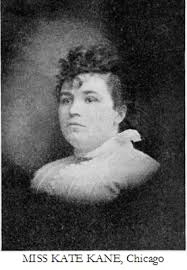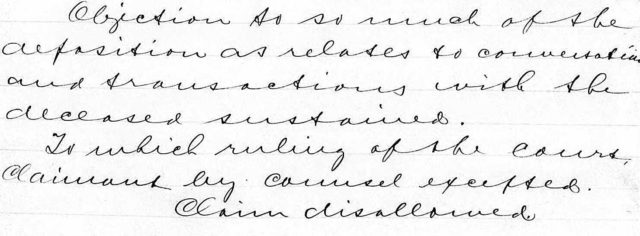“At the time of her death, Miss Goodell was in debt to me in the sum of $50.”
Kate Kane, January 1881
When Lavinia Goodell drafted her will in July of 1879, she no doubt believed that her estate would be divided exactly as she specified, and she probably did not expect anyone to file spurious claims. Unfortunately, her will was challenged and her friend and fellow Janesville attorney, Kate Kane, filed a claim against the estate.

Lavinia Goodell had a somewhat complicated relationship with Kate Kane, who in 1878 became Wisconsin’s second woman lawyer. Lavinia had mentored Kate, and while Lavinia admired the younger woman’s intelligence and legal acumen, she looked askance at some of Kate’s personal proclivities. At one point Lavinia wrote to her cousin, Sarah Thomas, “I don’t know but Miss K. means well enough but she certainly lacks judgment, principle, and refinement. I am getting to like her less and less, and I am sorry for it, for she has some desirable qualities.”
In 1879, Kate Kane moved her law practice to Milwaukee. She assisted Lavinia in Ingalls v. State, the case that finally brought about Lavinia’s admission to the Wisconsin Supreme Court bar. By the time Lavinia went to Milwaukee to seek medical treatment in January 1880, she was in such a weakened condition that her once prolific diary entries and letters all but ceased. Lavinia left no written record of having contact with Kane Kane in the weeks before she died, but it is not surprising that that Kate would have visited. What is more unexpected is that Kate filed a claim for $50 against the estate seeking reimbursement for both personal and legal work she claimed to have performed for Lavinia during her time in Milwaukee.
The executor of Lavinia’s estate, Janesville attorney S.A. Hudson, contested Kate’s claim and took testimony before a Milwaukee County court commissioner in early January 1881. (Read Kate’s testimony here .)
Kate claimed she spent three half days shopping for Lavinia around March 30, 1880 (one day before Lavinia’s death) and said during that time she purchased underclothing and arranged for a seamstress to make several garments for Lavinia. Kate sought reimbursement of $6.00 for those errands. Kate also charged $5.00 for her assistance in the Ingalls case and $10.00 for drafting an amendment to Wisconsin statutes which she said she presented to a state senator.
In addition, Kate said she rendered professional services and advice, including examination of an abstract, to Lavinia in the contemplated divorce proceedings of Lavinia’s sister, Maria Frost, and her husband, Rev. Lewis Frost. Kate testified:
At the time Miss Goodell went to Dr. Hanson’s she was preparing to get a divorce for her sister, Mrs. Frost. She wanted property deeded over to her sister, and it was with that view the abstract was sent to her. I assisted her in examining it. She hadn’t commenced any suit for divorce, but she was preparing for it…. For the consultation and advice and assistance in the divorce I charged $20.00. Miss Goodell asked my advice. She was flat on her back and there were authorities to be examined.
Kate explained that Maria was living in Oberlin, Ohio, at the time and Rev. Frost was living in Michigan. When asked whether Lavinia expected any pay from her sister, Kate responded, “I don’t know. She was so mad when her sister wrote that she was going to live with her husband again that she said she had a good mind to send in her bill.”
Attorney Hudson asked, “When you did these things for Miss Goodell, didn’t you do them as a friend, without any expectation of compensation?” Kate’s response was, “No, not exactly as a friend. It was understood between us that she would give me some compensation for work I did…. I only know it was understood between us that it would be made all right, and making it all right between us usually meant money.”
Dr. Hanson testified that Kate Kane visited Lavinia at his Turkish bath establishment. A dressmaker testified that she made a wrapper for Lavinia, at Kate’s request, and that Kate paid her $1.00 for her work. The woman in whose home Lavinia died testified that she saw Kate at the house at least twice but never saw Kate do any business for Lavinia and never heard Lavinia say that Kate had done business for her. In addition, the woman said that the day before Lavinia’s death, “she was insensible,” which called into question Kate’s assertion that Lavinia had asked her to purchase new clothing at that time.
The probate court ultimately disallowed Kate’s claim based on the dead man’s statute, which provides that in civil actions, a party with an interest in the litigation may not testify against a dead person about communications with the dead person.

Kate Kane went on to have a long legal career. In 1883 she ran for a seat on the Wisconsin Supreme Court and garnered three votes. She then moved to Chicago where she got married and practiced law into the early 1900s.
A future post will discuss the challenges to Lavinia’s will.
Sources consulted: Estate of Lavinia Goodell (Dane County, Wisconsin probate court); Lavinia Goodell’s letter to Sarah Thomas (Jan. 17, 1879).







